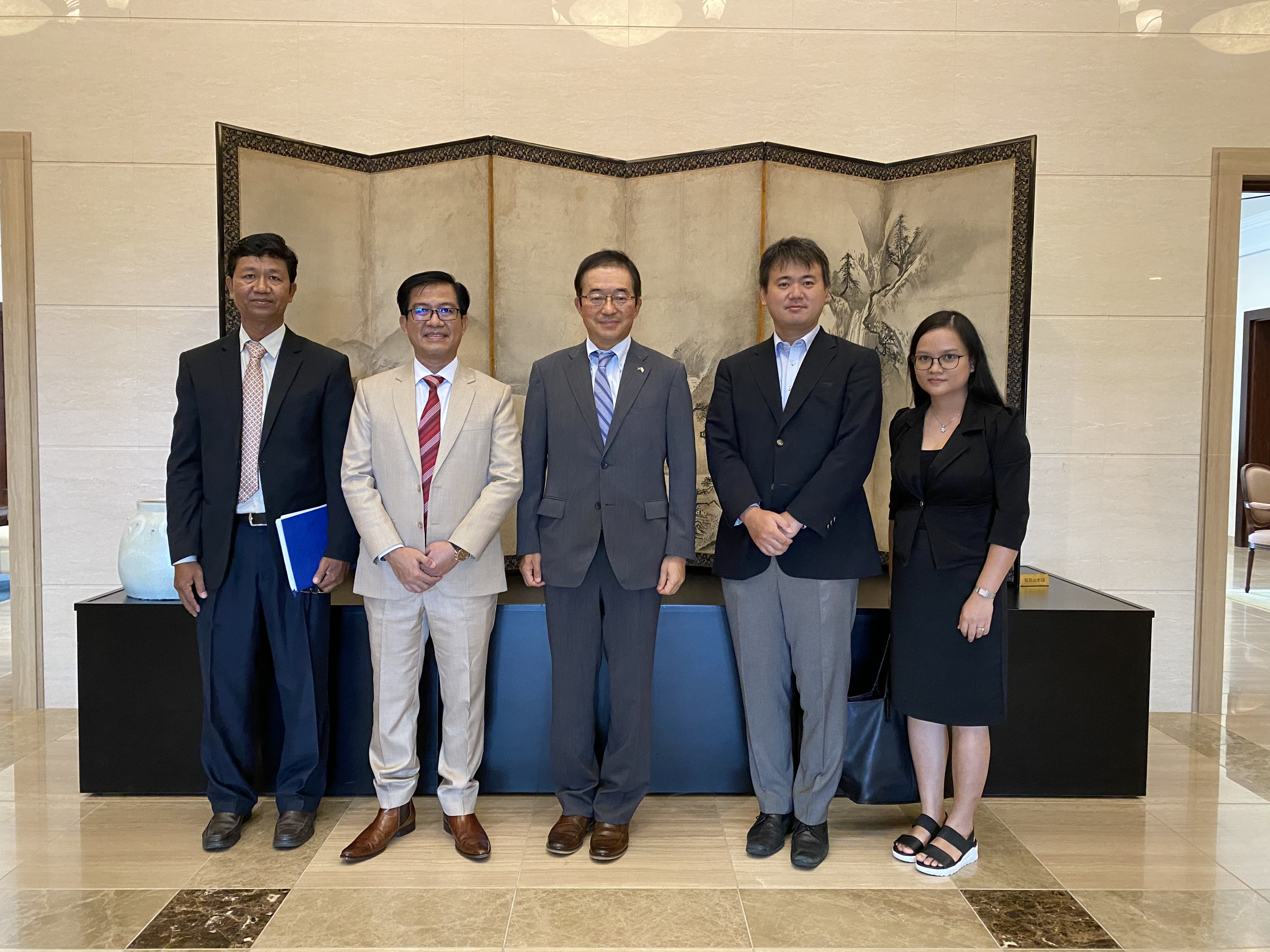Japan and IRRI discuss strengthened cooperation for agriculture sector in Cambodia and SEA

19 November 2020, Phnom Penh ~ A meeting between Japan’s Ambassador to Cambodia and the Southeast Asian Representative of the International Rice Research Institute (IRRI) discussed ideas on strengthening future partnership and collaboration between Japan and IRRI to support the Cambodian agricultural sector.
IRRI SEA Representative, Dr. Yasmi Yurdi, who is currently based in Cambodia, met with Japanese Ambassador to Cambodia, H.E. Masahiro Mikami, to convey the institute’s gratitude to the Government of Japan for its long-term and continued support of IRRI. The Ambassador, for his part, said was very pleased with the institute’s recognition of the Japanese government, and mentioned that he has known of IRRI for a long time and appreciates the importance of its work in the region.

Also present in the meeting were Second Secretary Mr. Kengo Matsuda of the Japanese Embassy, and IRRI’s Senior Manager Mr. Chantol Uch and Administrative Coordinator Ms. Sreyvanna Yath.
Japan and IRRI have been partners since the institute’s establishment in 1960. Japan is represented on the IRRI Board of Trustees and is one of IRRI’s most generous financial supporters, having given approximately USD 245 million as of 2017. In 1992, the Japanese government contributed USD 1.9 million to the construction of the Kenzo Hemmi Laboratory, named after a famed Japanese agriculturist, and also provided financial support for the construction of the Nyle C. Brady Laboratory, which houses the International Rice Genebank. IRRI works closely with Japanese agencies Japan International Cooperation Agency (JICA) and Japan International Research Center for Agricultural Sciences (JIRCAS). As a testament to the strong relationship, in 2016 Their Majesties Emperor Akihito and Empress Michiko visited IRRI Headquarters in Los Banos, the Philippines.
During the meeting, Dr. Yasmi acknowledged and thanked the Ambassador for Japan’s strong support of ASEAN Rice Net, and also for its commitment to support it financially through the Japan-ASEAN Integration Fund (JAIF). ASEAN Rice Net is a regional network for the sharing and evaluation of advanced IRRI-developed rice breeding lines, which is endorsed by all ASEAN Member States as well as by Japan, China, and South Korea. The network will accelerate farmers’ access to high-value varieties, including high-yielding, climate-smart, and healthier rice, and is projected to generate economic benefits of at least USD 500 million from variety releases alone across the region.
The discussion also touched on the partnership of IRRI with Nagoya University on its Transnational PhD Program, which allows professionals to pursue their doctoral studies in satellite campuses across Asia. This was highlighted as IRRI Senior Manager Mr. Chantol Uch was a student of the program.

Dr. Yasmi expressed IRRI’s interest in expanding research collaboration and synergies with Japan, such as in having more expertise from Japan in IRRI in the form of scientists, MSc, and PhD students working on research initiatives. He also specifically requested that Japan continue to consider its support for IRRI in the agriculture sector of Southeast Asia, especially in Cambodia. Ambassador Mikami agreed that Cambodia is an important growth area for agricultural development, as Japan is supporting several projects in the country such as rice value chains, irrigation, and roads. He took note of the request and asked for a follow-up at the working level with Second Secretary Kengo Matsuda.
At the end of the meeting, the discussion had strengthened the relationship between the two parties, establishing a more robust foundation for further cooperation and collaboration.
For IRRI activities in Southeast Asia, visit the IRRI Southeast Asia Page at irri.org
About IRRI
IRRI aims to improve livelihoods and nutrition, abolishing poverty, hunger, and malnutrition among those who depend on rice-based agri-food systems. In doing so, IRRI’s work protects the health of rice farmers and consumers, and the environmental sustainability of rice farming in a world challenged by climate change. IRRI’s work promotes the empowerment of women and supports opportunities for youth in an equitable agri-food system. IRRI is a part of the CGIAR global network.
irri.org
About CGIAR
As the world’s largest global agricultural innovation network, CGIAR brings evidence to policy makers, innovation to partners, and new tools to harness the economic, environmental and nutritional power of agriculture.
cgiar.org